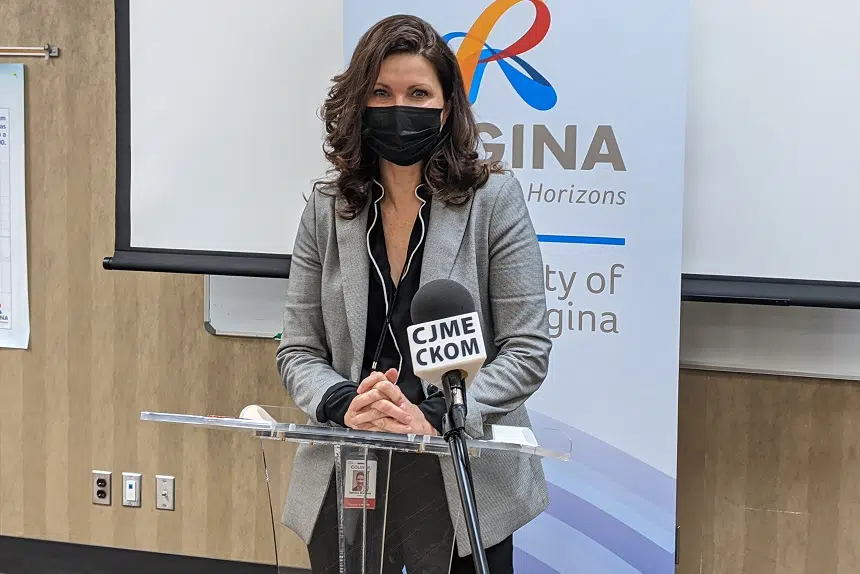Regina’s mayor issued a call to arms Tuesday.
Sandra Masters urged residents of the Queen City to get vaccinated against COVID-19 when they’re eligible since it’s the quickest way to get the spread of the virus under control — and it hasn’t been under control of late.
In the Ministry of Health’s daily COVID update, it was revealed the Regina area had 101 of the province’s 156 new cases.
It also had 61 of 66 new confirmed cases of variants of concern — giving the region 122 of the 136 confirmed cases so far — and 186 of the province’s 210 presumed cases.
As well, Regina had 535 of the province’s 1,292 active COVID cases.
“We cannot let our guard down today and for at least the next four weeks in this battle that we’re in with COVID-19,” Masters said during a media conference. “As a community, we’re facing an unprecedented time with cases of the COVID variant rising in our community.
“We have to take an immediate stand. We have to be better.”
The recent uptick in Regina stands in stark contrast to other areas of the province.
Dr. Saqib Shahab, the province’s chief medical health officer, said during a conference call Regina’s case numbers are going up while other areas are seeing a sharp decrease. The test positivity rate in the province is 5.6 per cent, but it’s 9.1 in Regina.
“In Regina, we are seeing what we expected to see,” Shahab said of the rise in the number of variant cases being detected. “But obviously when it comes, it is always concerning and when you actually see it, it’s also surprising …
“Two weeks (or) three weeks ago, we couldn’t predict where the variants of concern would take over. Right now, they’ve taken over in Regina, so obviously we have to adjust the guidance.”
The current public health orders that were to expire Friday have been extended to April 5.
Changes were made to the orders last week to allow household bubbles to expand to 10 people from a maximum of three households, and to allow places of worship to have 150 people or 30 per cent of their seating capacity (whichever is less) at services.
On Tuesday, the provincial government announced the latter change wouldn’t be happening in Regina or the communities of Belle Plaine, Pense, Grand Coulee, Lumsden Beach, Regina Beach, Craven, Lumsden, Edenwold, Pilot Butte, White City, Balgonie, Kronau, Davin, Gray and Riceton. Religious gatherings in those centres are still capped at 30 people.
Given the numbers in the region, the government again suggested people over the age of 50 should consider not expanding their bubbles beyond their immediate household. It also recommended people shouldn’t travel to or from the area.
“This is not the time to travel out of Regina or come into Regina for things that are not essential because we want to minimize the export of variants to other communities unnecessarily and minimize people coming into Regina and getting exposed to variants of concern as much as we can,” said Shahab, who noted travel for things like medical appointments and work would need to continue.
There weren’t any new measures put on Regina, but Masters noted the city is essentially “on notice.”
“I am asking every member of our community for help,” she said. “This has always been a team approach, a community approach and one founded in the greatest respect for our neighbours and our most vulnerable residents.
“If you will be in contact with someone who is 50 years of age or older, do not participate in gatherings outside of your immediate household, regardless of what has been announced … Take the steps necessary to keep our city safe and be very careful for the next little while.”
Premier Scott Moe said the public health measures currently in place have been effective in lowering case numbers in the province, so new rules weren’t required to reduce the numbers in the Regina area. What is required, he said, is adherence to the rules — and vaccinations.
Moe said additional doses will be directed to Regina in the coming days so that, by April 5, 65,000 doses will be available to the 75,000 people aged 60 and over who live in the Regina area.
“We have public health measures and it’s important for all of us, in particular in Regina, to adhere to those measures very closely over the course of the next number of weeks,” Moe said when asked why more measures weren’t enacted. “But we also have access to vaccines.
“With 86 per cent of people over 60 being able to have access to that vaccine here in Regina by April 5, we have additional tools that up until this point in time we just simply haven’t had.”
Vaccines have been diverted to Regina — Moe pointed to the 15,500 AstraZeneca doses being doled out at the drive-through clinic at Evraz Place this week — to help address the situation in the area.
While Moe and Shahab admitted some changes to the measures may be in the offing if the numbers in Regina don’t start dropping, both men dismissed the idea of a complete lockdown for the city.
“Some of those lockdown measures are very blunt instruments,” Shahab said. “They don’t always hit all the sectors that may be causing the bulk of the transmission.
“That may have to be considered, but even they take time to have an impact — and slowdown measures can have a similar impact. But it needs all of us to comply and that will be the key thing here.”
NDP weighs in
NDP Health Critic Vicki Mowat said the government’s handling of the cases in Regina flew in the face of warnings against relaxing health measures.
“The huge explosion in confirmed and suspected variants of concern in Regina has forced the government to urge people in Regina not to do what they were just told they were allowed,” Mowat said in a statement.
“The premier’s chaotic handling of COVID-19 has led to mixed messages and confusion for Saskatchewan families, not to mention the worst results in the country for the majority of 2021.”
The NDP critic said Saskatchewan families “are paying the price” for the government’s decisions in relation to containing the spread of the virus.
“Scott Moe’s poor decisions meant we have been left with the worst of both worlds: A crumbling economy with 23,000 more people unemployed and the worst COVID-19 results in Canada,” Mowat said.











